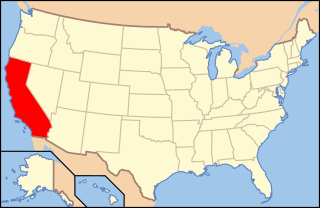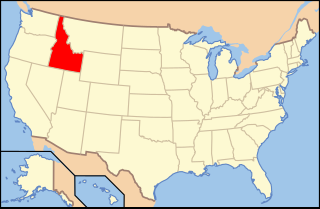
Lisa Ann Murkowski is an American politician serving as the senior United States Senator from Alaska, having held that seat since 2002. She is a member of the Republican Party, and is the second most senior Republican woman in the Senate. Along with Susan Collins from Maine, she is frequently described as one of the most moderate Republicans in the Senate and is a crucial swing voter.

The University of Alaska Anchorage (UAA) is a public research university located in Anchorage, Alaska. UAA also administers four community campuses spread across Southcentral Alaska. These include Kenai Peninsula College, Kodiak College, Matanuska–Susitna College, and Prince William Sound College. Between the community campuses and the main Anchorage campus, over 20,000 undergraduate, graduate, and professional students are currently enrolled at UAA. This makes it the largest institution of higher learning in the University of Alaska System, as well as the state.

The term unisex public toilets is meant to refer herein to public toilets that are not separated by gender or sex. Unisex public toilets can be designed to benefit a range of people with or without special needs, for example people with disabilities, the elderly, and anyone who needs the help of someone of another gender or sex. They are also valuable for parents wishing to accompany one or more of their children needing a toilet facility.
Mark L. Cole is an American politician of the Republican Party. Since 2002 he has been a member of the Virginia House of Delegates. He currently represents the 88th district in the Virginia Piedmont, made up of parts of Fauquier, Spotsylvania and Stafford Counties, and the City of Fredericksburg, Virginia.
Transgender rights in the United States vary considerably by jurisdiction.

Lesbian, gay, bisexual, and transgender (LGBT) people in the U.S. state of Florida may face legal challenges not experienced by non-LGBT residents. Same-sex sexual activity became legal in the state after the U.S. Supreme Court's decision in Lawrence v. Texas on June 26, 2003, and same-sex marriage has been legal in the state since January 6, 2015. Florida law does not address discrimination on the basis of sexual orientation in employment, housing and public accommodations. However, several cities and counties, comprising about 55% of Florida's population, have enacted anti-discrimination ordinances. These include Jacksonville, Miami, Tampa, Orlando, St. Petersburg, and Tallahassee, among others. Furthermore, discrimination on the basis of gender identity has been illegal in Florida since 2011 via Glenn v. Brumby, a court case decided by the Eleventh Circuit Court of Appeals. Conversion therapy is also banned in a number of cities in the state, mainly in the Miami metropolitan area.

California is seen as one of the most liberal states in the U.S. in regard to lesbian, gay, bisexual, transgender (LGBT) rights, which have received nationwide recognition since the 1970s. Same-sex sexual activity has been legal in the state since 1976. Discrimination protections regarding sexual orientation and gender identity or expression were adopted statewide since 2003. Public schools are also required to teach about the history of the LGBT community and transgender students are allowed to choose the appropriate restroom or sports team that match their gender identity. Mental health providers are prohibited from participating in conversion therapy for LGBT minors.

The establishment of lesbian, gay, bisexual, and transgender (LGBT) rights in the U.S. state of Vermont is a recent occurrence, with the majority of progress having taken place in the late 20th century and the early 21st century. Vermont was one of the 37 U.S. states, along with the District of Columbia, that issued marriage licenses to same-sex couples, until the landmark Supreme Court ruling of Obergefell v. Hodges that legalized equal marriage rights for same-sex couples nationwide.

Lesbian, gay, bisexual, and transgender (LGBT) rights in the U.S. state of Washington have evolved significantly since the late 20th century. LGBT people are fully protected from discrimination; Washington enacted LGBT protections in 2006. Same-sex marriage has been legal since 2012, and same-sex couples are allowed to adopt. Conversion therapy on minors has also been illegal since 2018.

Lesbian, gay, bisexual, transgender, and queer (LGBTQ+) rights in the U.S. state of Maine are a recent occurrence, with most advances and enhances in LGBT rights in the state taking place since the early 2000s. LGBTQ+ people in Maine have some of the same rights and responsibilities as heterosexuals, however may face some legal issues not experienced by non-LGBTQ+ residents.

Lesbian, gay, bisexual, and transgender (LGBT) people in Texas face legal and social challenges and discrimination not faced by other people. Same-sex sexual activity is legal in the state. On June 26, 2015, the Supreme Court of the United States ruled bans on same-sex marriage to be unconstitutional in Obergefell v. Hodges. Texas has a hate crime statute that strengthens penalties for certain crimes motivated by a victim's sexual orientation, although it has never been invoked. Gender identity is not included in the hate crime law. There is no statewide law banning anti-LGBT discrimination. However, some localities in Texas have ordinances that provide a variety of legal protections and benefits to LGBT people.

Lesbian, gay, bisexual and transgender (LGBT) people in the U.S state of Idaho may face some legal challenges not faced by non-LGBT people. Same-sex sexual activity is legal in Idaho, and same-sex marriage has been legal in the state since October 2014. Discrimination based on sexual orientation and gender identity is not banned in the state, leaving an estimated 31,800 LGBT workers in Idaho vulnerable to employment discrimination. Despite this, opinion polls have found a majority of Idahoans as supporting LGBT anti-discrimination laws, same-sex marriage and LGBT rights.

Lesbian, gay, bisexual, and transgender (LGBT) persons in the U.S. state of Alaska may face some legal challenges not experienced by non-LGBT Alaskans. Same-sex sexual activity has been legal since 1980, and same-sex couples have had the right to marry since October 2014. Nevertheless, the state offers few legal protections on the basis of sexual orientation and gender identity, leaving LGBT people vulernable to employment, housing, and public accommodations discrimination. Discrimination against state employees on account of their sexual orientation is illegal, and three Alaskan cities, Anchorage, Juneau and Sitka, representing about 46% of the Alaskan population, have enacted anti-discrimination ordinances covering both categories.
Linda F. Collins-Smith is a Republican member of the Arkansas State Senate from Pocahontas in Randolph County in northeastern Arkansas. Since 2015, she has represented Senate District 19.
Proposition 1 was a referendum held on November 3, 2015, on the anti-discrimination ordinance known as the Houston Equal Rights Ordinance (HERO). The ordinance was intended to improve anti-discrimination coverage based on sexual orientation and gender identity in Houston, specifically in areas such as housing and occupation where no anti-discrimination policy existed. Proposition 1 asked voters whether they approved HERO. Due to concerns about the bill being misused to allow men in women's restrooms, thus spawning the nickname of "The Bathroom Bill," Houston voters rejected Proposal 1 by a vote of 61% to 39%.
South Dakota House Bill 1008, also known as House Bill 1008, HB 1008, and the Bathroom Bill, was a bill passed by the South Dakota Legislature in 2016 and vetoed by Governor of South Dakota Dennis Daugaard. The purpose of the bill was to restrict bathroom and locker room use by transgender students to facilities that matched their sex assigned at birth, not their gender identity. It was the first such bathroom bill to be passed in a state legislature in the U.S. and sparked a chain of similar bills across the nation. HB 1008 was opposed by several LGBT rights organizations, such as the HRC, GLSEN, and ACLU.
This article addresses the legal and regulatory history of transgender and transsexual people in the United States including case law and governmental regulatory action affecting their legal status and privileges, at the federal, state, municipal, and local level, and including military justice as well.

The Massachusetts Gender Identity Anti-Discrimination Initiative is a state-wide referendum passed by Massachusetts voters in the 6 November 2018 mid-term election that prohibits discrimination in public accommodations on the basis of gender identity. The vote upholds language which was already present in the state anti-discrimination statute, defeating an attempt to veto it by public referendum. It is the first state-wide anti-discrimination statute passed by referendum supporting transgender rights in the United States.
Since 2015, Township High School District 211 (D211), a public school district of the Chicago suburbs, has been the epicenter of multiple controversies surrounding its policies toward transgender student locker room access. D211 was the first school district to be found in violation of civil rights law on the basis of transgender issues by the United States Department of Education's Office for Civil Rights (OCR). A lawsuit involving D211's policies toward transgender students was the first legal challenge to the Obama Administration's interpretation of Title IX as allowing transgender students to use the locker room and bathroom facilities corresponding to their gender identity.













